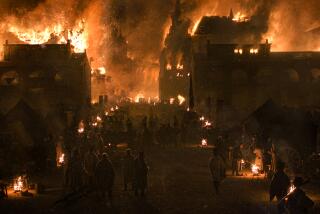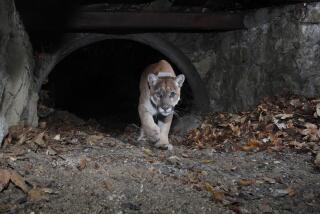Carl Davis’ Forte Is the Sound of Silents
- Share via
Since composing a score in 1980 for the Kevin Brownlow-David Gill restoration of Abel Gance’s “Napoleon” for its presentation at the Empire Cinema in London’s Leicester Square, Carl Davis has scored two dozen silent films in addition to continuing his richly varied career as a conductor and composer, which includes his collaboration last year with Paul McCartney on McCartney’s “Liverpool Oratorio.”
Tonight at 7 in UCLA’s Royce Hall, Davis, in his second appearance at the helm of the Los Angeles Chamber Orchestra, will conduct a performance of his score accompanying King Vidor’s 1925 anti-war classic “The Big Parade.”
“Silent film has taken me out of the back room--the recording studio--and it has also given me a conducting career,” Davis said last weekend. He was sitting in a suite in a Westwood hotel cater-cornered from the site where Vidor shot the last scene of “The Big Parade,” which stars John Gilbert as a rich American playboy, whose naive patriotism turns to horror in the trenches of World War I France.
Davis’ score for “The Big Parade” is one of an ongoing series of compositions for silents commissioned by Thames Television in the wake of his work on “Napoleon.”
In no time Davis had a videocassette of “The Big Parade” playing on his hotel room TV, and the matches between Vidor’s images and his themes were so inspired and involving as to make it hard to turn off the film.
“It’s really like writing an opera,” he explained. “You establish themes and develop them. Vidor himself said that 60% of the effectiveness of silent movies is in the right music. In the original score there were some chansons that were good--those we used--and we also worked in ‘Over There’ and ‘You’re in the Army Now’--they were in the original, too. But as for the music by studio hacks, I thought we could do better.”
Over the last 12 years Davis has been confronted with silents with no known scores extant, those with a few cues, and those with complete scores intact.
Davis, 55, a native New Yorker who has lived in London since 1960, insists on working with the best, most complete prints possible--often scores provide clues to missing sections that sometimes can be obtained from another print--and he stresses the importance of projecting silent films at the proper speed.
He will next work on “The Four Horseman of the Apocalypse” (1921), the film that made Rudolph Valentino a star and is famous for his tango but for which there is no complete score, and then “Safety Last” (1923) to commemorate the 100th anniversary of the birth of Harold Lloyd next year. Also in the works is a reconstruction of Charles Chaplin’s score for “The Gold Rush” (1925).
Davis has been invited to conduct his film scores all over the world. He has accompanied “The Big Parade,” for example, in New York, Barcelona and Antwerp--”just 50 meters away from the World War I battlefield.” He also has commenced the resconstruction of important scores for sound films. His reconstruction of Erich Wolfgang Korngold’s score for “The Private Lives of Elizabeth and Essex” (1939) is now out on CD.
“The buzz of it--the thrill of it--is that you’re doing a concerto for film as you would a ballet as well as an opera. Instead of singers and dancers, you have these marvelous images.” Davis also has composed scores for numerous contemporary films, including “The French Lieutenant’s Woman.”
“My aim is not to betray the film--let’s make it work, let’s make it live,” said Davis. With “The Big Parade” he found the opportunity to help make the film, through his music, “leap into the 20th Century.”
For “The Big Parade,” ticket information: (213) 622-7001.
More to Read
The biggest entertainment stories
Get our big stories about Hollywood, film, television, music, arts, culture and more right in your inbox as soon as they publish.
You may occasionally receive promotional content from the Los Angeles Times.










